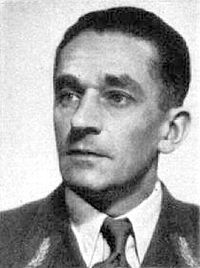Sudetendeutsches Freikorps
| Sudeten German Free Corps | |
|---|---|
| Sudetendeutsches Freikorps | |

Sudetendeutsches Freikorps members
|
|
| Active | 1938 to 1939 |
| Country |
|
| Allegiance | Adolf Hitler |
| Type | Terrorist organization |
| Role | Break-up of Czechoslovakia |
| Engagements | Undeclared German-Czechoslovak war |
| Commanders | |
| de facto commander |
|
| formal commander |
|
| vice-commander |
|
| chief of staff |
|
| Freiwilliger Schutzdienst | |
|---|---|
| Ordnersgruppe | |

Karl Hermann Frank, FS's vice-Führer who was receiving orders directly from Hitler
|
|
| Active | 17 May 1938 to 16 September 1938 |
| Country |
|
| Allegiance |
|
| Type | terrorist organization |
| Role | break-up of Czechoslovakia |
| Commanders | |
| Führer |
|
| Vice-Führer |
|
| Secretary |
|
| Chief of staff |
|
| Sudeten German Party Putsch | |||||||
|---|---|---|---|---|---|---|---|
| Part of German occupation of Czechoslovakia | |||||||
|
|||||||
| Belligerents | |||||||
|
|
|||||||
| Commanders and leaders | |||||||
|
|
|||||||
| Casualties and losses | |||||||
| 10 dead, over dozen wounded | over 23 dead, over 60 wounded | ||||||
| Violence led large number of Jews, Czechs and anti-fascist Germans to flee from borderlands further to inland Czechoslovakia. Following restoration of order by Czechoslovak authorities, tens of thousands of pro-Nazi ethnic Germans fled to Germany to avoid either arrest or Czechoslovak army mobilization order. | |||||||
| Sudeten German uprising | |||||||
|---|---|---|---|---|---|---|---|
| Part of German occupation of Czechoslovakia | |||||||
 Marching Freikorps unit |
|||||||
|
|||||||
| Belligerents | |||||||
|
|||||||
| Commanders and leaders | |||||||
| Casualties and losses | |||||||
|
Freikorps:
|
Armed forces:
|
||||||
| Violence led large number of Jews, Czechs and anti-fascist Germans to flee from borderlands further to inland Czechoslovakia. Clashes continued also after Czechoslovakia ceded the borderlands to Germany. | |||||||
Sudetendeutsches Freikorps (Sudeten German Free Corps, also known as the Freikorps Sudetenland, Freikorps Henlein and Sudetendeutsche Legion) was a paramilitary Nazi organization founded on 17 September 1938 in Germany on direct order of Adolf Hitler. The organization was composed mainly of ethnic German citizens of Czechoslovakia with pro-Nazi sympathies who were sheltered, trained and equipped by German authorities and who were conducting cross border terrorist operations into Czechoslovak territory from 1938 to 1939. They played important part in Hitler's successful effort to occupy Czechoslovakia and annex the region known as Sudetenland into the Third Reich under Nazi Germany.
Sudetendeutsches Freikorps was a factual successor to Freiwillinger Schutzdienst, also known as Ordnersgruppe, an organization that had been established by the Sudeten German Party in Czechoslovakia unofficially in 1933 and officially on 17 May 1938, following the example of Sturmabteilung, the original paramilitary wing of the German Nazi Party. Officially being registered as promoter organization, the Freiwillinger Schutzdienst was dissolved on 16 September 1938 by the Czechoslovak authorities due to its implication in large number of criminal and terrorist activities. Many of its members as well as leadership, wanted for arrest by Czechoslovak authorities, had moved to Germany where they became the basis of Sudetendeutsches Freikorps, conducting Freikorps' first cross-border raids into Czechoslovakia only few hours after its official establishment. Due to the smooth transition between the two organizations, similar membership, Nazi Germany's sponsorship and application of the same tactic of cross-border raids, some authors often don't particularly distinguish between the actions of Ordners (i.e. up to 16 September 1938) and Freikorps (i.e. from 17 September 1938).
Relying on the Convention for the Definition of Aggression, Czechoslovak president Edvard Beneš and the government-in-exile later regarded 17 September 1938, the day of establishment of the Sudetendeutsches Freikorps, as the beginning of the undeclared German-Czechoslovak war. This understanding has been assumed also by the contemporary Czech Constitutional court.
...
Wikipedia
